The FluteFling Collection book launch and workshops 9 July 2022
Return to in-person events
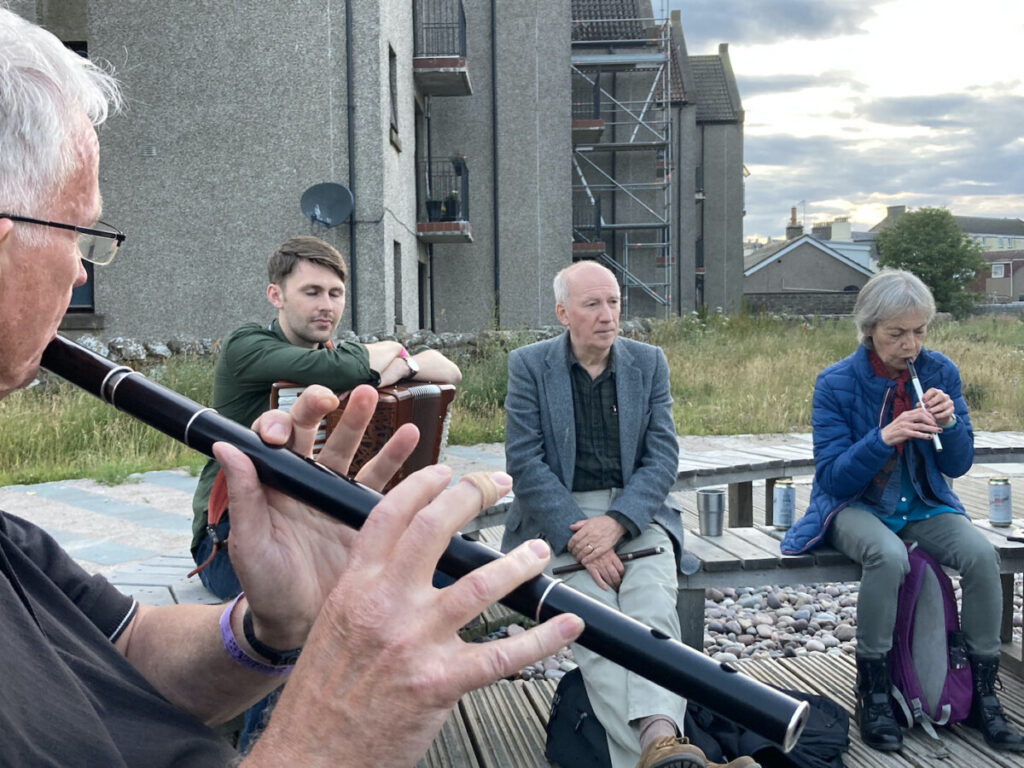
John Crawford, Euan Reid, Kenny Hadden and Sharon Creasey at an outdoor session at Stonehaven. (c) Gordon Turnbull
Getting back into in-person events was never going to be easy, but we knew we had to launch the tunebook at some point. We couldn’t have chosen a better way, than at the 33rd Stonehaven Folk Festival. Just south of Aberdeen, it is a long established landmark festival in Scotland. With a number of artists appearing that included the flute or whistle — Flook, Rura and Deira from Asturias, it was definitely a good match.
Sharon Creasey, Kenny Hadden and myself, with John Crawford and Peter Saunders, had begun thinking about this last year but found it tricky with Covid levels being so unpredictable. Thinking about how we might have to manage an in-person event in such a climate was difficult. When I looked in January, there were still restrictions on room capacity and requirements for mitigation. The rules changed but could have changed again by the time we had responded. FluteFling is run in people’s spare time and there were organisations with full time staff who struggled, so it wasn’t going to be simple.
On top of that, we were collectively no longer used to playing in sessions, performing and teaching. I think I hadn’t taught for 2 years and certainly hadn’t played on stage for 3 or 4 years. There were steep relearning curves whichever way we looked. So Kenny approached Stonehaven organisers Charlie West and Meg Findlay knowing that we needed a bit of help.
To their credit, they understood the situation and used their experience to make it straightforward. The festival was only just returning after having to cancel the last two years and the performers that weekend were rebooked from the 2020 weekend that didn’t run. Clearly, trying to get back to the things that matter to us was a theme of the weekend.
John Crawford completed the necessary risk assessments for the workshops and he and Pete Saunders were volunteering, so we were well looked after and it was less to think about.
Setting up
The weekend was set to be a sunny one and we set our stall and new banners up in the hot and sometimes busy bar in the Town Hall on the Friday evening. Coralie Mills had kindly volunteered to run the stall, the new banners drew attention and the contactless machine was soon doing its business as we drew some friendly attention and began selling our first copies.
Having worked on this for over a year, largely in lockdown, it was difficult to gauge what kind of response the book might have. Sharon in particular had shaped it with the contributors and we could see a value in it that we hoped others would recognise. So it was gratifying to see the response from all musicians, not just flute and whistle players. Thank you to everyone who took the time to speak to us about it over the weekend.
The stall was in the bar upstairs from the concert hall and we able to quietly nip in and out to the balcony and watch some of the performances in between catching up with each friends we hadn’t seen in person for a while.
Flook were in fine energetic form and, as expected, extraordinarily tight and focused. We had put up a signed copy of the tunebook as a raffle prize and were bowled over to discover that the whole band had supported us by adding their signatures. Somebody walked away that evening with quite a special prize.
Fèis and chips
The Saturday workshops at Dunottar Primary School were low key and with a friendly and helpful Janny and volunteers we were quickly set up. The morning workshops were beginner flute (Kenny Hadden) and beginner whistle (myself and Sharon Creasey). It was the first time that we had tried two tutors in one workshop, but it meant that Sharon and I could address individual issues and compare notes as we went along — it’s always good to hear different perspectives on the same subject.
In the afternoon, Sharon took an advanced whistle class while I took the flute class. Everyone was at different stages of returning to playing music again — some had not played for months, some had not been in sessions, others had happily been playing away in person or online. It was tricky to get the balance right, but we all had to begin somewhere.
Returning to teaching after a gap of 2 years was also a personal challenge. There was lots of talk and questions and in the back of my mind, I could hear Hammy Hamilton’s comment from Cruinniú na Bhfliúit, that he was always happy to hear talk coming from a room because it meant that people were discussing questions rather than simply learning tunes. As David Fednandez said, he was just happy to be back with others again playing the flute.
Straight after the workshops, Kenny and I did a performance spot in the marquee in the square. We played some of our tunes from the book, including a duet. As many musicians elsewhere had said, it was good to get back to performing. Some of it felt familiar, other parts a bit alien after the last few years, but the sound was good and the audience enjoyed it.
The Asturian band Deira followed us on stage and were complimentary. As we dashed across the road to the book launch, their amazing sound rang out across the square and I made a mental note to try and hear more of them.
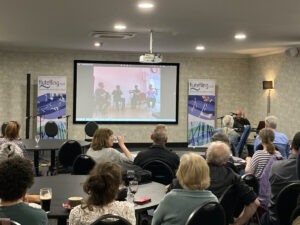
Kenny Hadden giving a talk at Stonehaven on the revival of the flute in Scottish traditional music (c) Gordon Turnbull
In the function room of No. 44, around 50 people had gathered to hear Kenny, who had set himself up to give an illustrated talk on the revival of the flute in traditional Scottish music.
With a big display screen and good sound, his meticulous trawl through the archives was an expansion on his essay in The FluteFling Collection that had people talking afterwards.
I think most people learned something new and to others it was a complete revelation. There were good questions from an engaged audience afterwards and I hope that there will be other chances to hear Kenny present this again.
Kenny, Sharon and myself followed the talk with a short recital of our own contributions to The FluteFling Collection. Peter Saunders was there and you can hear some of the performance on Peter’s YouTube channel:
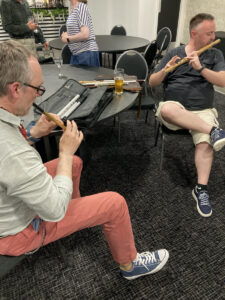
An Aberdeen-based Polish whistler and David Fernandez at the book launch session. (c) Gordon Turnbull
There was a short session afterwards and friends were able to catch up with each other. Somehow, there’s never enough time to do everything we would like to do.
We were fortunate in that the Festival had donated the space to us and provided a sound technician to help set us up. With pubs and bars filled with music across the town, we also our own space to play and could hear each other.
The bookstall still needed manning and people were getting hungry after a long day
I managed to catch Deira perform after the launch. The trio have a tight and driving sound that reminds me of Rura, but playing traditional Asturian and original tunes with a creative use of live loops and effects.
It’s easy to see how they went down well at Celtic Connections just before the pandemic and I recommend checking them out.
We ended up taking fish suppers to the splendid boardwalk that runs along the shore. A tune was soon struck up and we were joined by the Paddy Buchanan Band who had done a great performance on the Friday night. It was a fine evening to cap a fine day.
Easy like Sunday lunchtime
On Sunday, we took some time to tie up the loose ends, drink coffee and reflect on the launch, thinking of what happens next.
There was such a buzz from being with people again, many of whom we hadn’t seen for a couple of years, and playing music together. The support and goodwill towards FluteFling was overwhelming, so thank you to everyone who helped to make it happen and to those who managed to attend.
Our thanks go to the organisers for accommodating us and making us feel so welcome. This was most certainly a case of a bigger organisation being true to their roots and seeing the opportunity to give a helping hand to a smaller organisation such as ourselves to get going again in the post-lockdown world. We were able to provide workshops in return and so the benefit was mutual and we would consider similar arrangements in future.
Our thanks too, for Tasgadh for the grant and support that enabled the publication of the book in the first place and to the amazing contributors who were so keen to be part of this project. To order your own copy of The FluteFling Collection in Print or eBook format, visit the FluteFling Shop.
It was a memorable weekend and we resolved to have a similar event in Edinburgh. Covid and personal circumstances have delayed this, but we all look forward to the next one. Sign up to the newsletter to hear about it first.



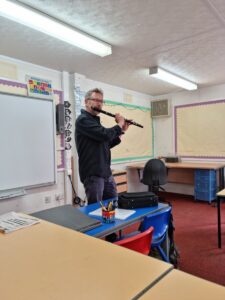
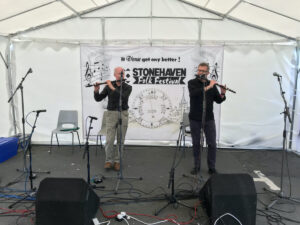

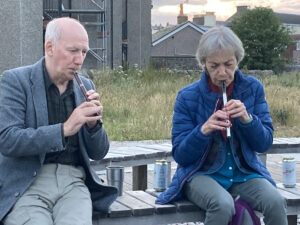
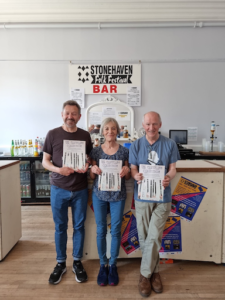

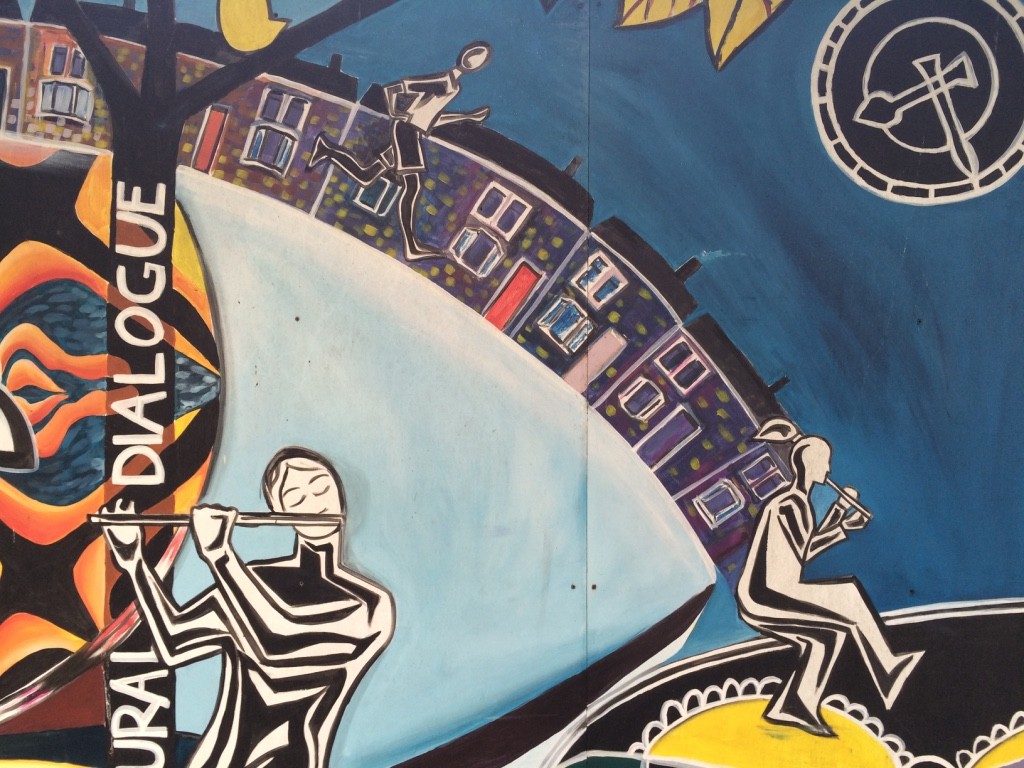
 FluteFling classes are taking a break this term, but will aim to be back in the New Year.
FluteFling classes are taking a break this term, but will aim to be back in the New Year.